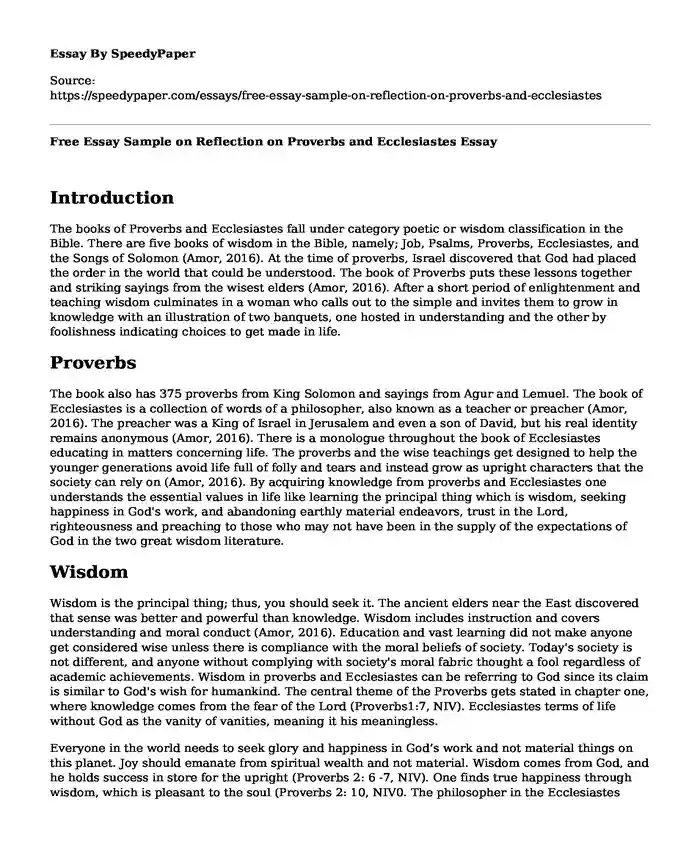
| Essay type: | Book review |
| Categories: | Ethics Bible |
| Pages: | 3 |
| Wordcount: | 762 words |
Introduction
The books of Proverbs and Ecclesiastes fall under category poetic or wisdom classification in the Bible. There are five books of wisdom in the Bible, namely; Job, Psalms, Proverbs, Ecclesiastes, and the Songs of Solomon (Amor, 2016). At the time of proverbs, Israel discovered that God had placed the order in the world that could be understood. The book of Proverbs puts these lessons together and striking sayings from the wisest elders (Amor, 2016). After a short period of enlightenment and teaching wisdom culminates in a woman who calls out to the simple and invites them to grow in knowledge with an illustration of two banquets, one hosted in understanding and the other by foolishness indicating choices to get made in life.
Proverbs
The book also has 375 proverbs from King Solomon and sayings from Agur and Lemuel. The book of Ecclesiastes is a collection of words of a philosopher, also known as a teacher or preacher (Amor, 2016). The preacher was a King of Israel in Jerusalem and even a son of David, but his real identity remains anonymous (Amor, 2016). There is a monologue throughout the book of Ecclesiastes educating in matters concerning life. The proverbs and the wise teachings get designed to help the younger generations avoid life full of folly and tears and instead grow as upright characters that the society can rely on (Amor, 2016). By acquiring knowledge from proverbs and Ecclesiastes one understands the essential values in life like learning the principal thing which is wisdom, seeking happiness in God's work, and abandoning earthly material endeavors, trust in the Lord, righteousness and preaching to those who may not have been in the supply of the expectations of God in the two great wisdom literature.
Wisdom
Wisdom is the principal thing; thus, you should seek it. The ancient elders near the East discovered that sense was better and powerful than knowledge. Wisdom includes instruction and covers understanding and moral conduct (Amor, 2016). Education and vast learning did not make anyone get considered wise unless there is compliance with the moral beliefs of society. Today's society is not different, and anyone without complying with society's moral fabric thought a fool regardless of academic achievements. Wisdom in proverbs and Ecclesiastes can be referring to God since its claim is similar to God's wish for humankind. The central theme of the Proverbs gets stated in chapter one, where knowledge comes from the fear of the Lord (Proverbs1:7, NIV). Ecclesiastes terms of life without God as the vanity of vanities, meaning it his meaningless.
Everyone in the world needs to seek glory and happiness in God’s work and not material things on this planet. Joy should emanate from spiritual wealth and not material. Wisdom comes from God, and he holds success in store for the upright (Proverbs 2: 6 -7, NIV). One finds true happiness through wisdom, which is pleasant to the soul (Proverbs 2: 10, NIV0. The philosopher in the Ecclesiastes argues all that is labored for and done under the Sun is meaningless because nothing is new, and in the end, everything goes back where we started. Only God and his work remain. The rest is vanity (Amor, 2016). The philosopher also was a king of Israel over Jerusalem, and nothing did he lack anything from fine wine to all great projects but later learned he was chasing after the wind.
Trust in the Lord, be righteous, and preaching God's ministry is the way forward, leading to wisdom in Proverbs and Ecclesiastes. God straightens the paths of those who trust in him and do not rely on their understanding by not proclaiming to be wise in what they can see (Proverbs 3: 5-7, NIV). The Lord hates foolishness and folly (Proverbs 6:16-19, NIV). Preaching and spreading God's wisdom makes someone wise in the Lord's sight. Through preaching, one can reach out to those led astray by material things, wine, beer, pleasures of life, and other bad habits that are not wise and deny them God's favor.
Conclusion
In conclusion, the book of Ecclesiastes rebukes folly through words like vanity and meaningless. In proverbs, their sayings, stories, and examples of how one can live a successful life with Lord's favor, especially the youth. The purpose of the two books is to make life in society more secure, meaningful, and more cohesive. Wisdom leads to success, while folly yields grief and misery.
References
Amor, M. (2016). Book Review: Introducing the Old Testament: Bill T. Arnold and Bryan E. Beyer, Encountering the Old Testament: A Christian Survey. The Expository Times, 127(9), 457-457. doi:10.1177/0014524616639880
The Holy Bible, new international version. (1984). Grand Rapids: Zondervan Publishing House.
Cite this page
Free Essay Sample on Reflection on Proverbs and Ecclesiastes. (2023, Oct 31). Retrieved from https://speedypaper.com/essays/free-essay-sample-on-reflection-on-proverbs-and-ecclesiastes
Request Removal
If you are the original author of this essay and no longer wish to have it published on the SpeedyPaper website, please click below to request its removal:
- Religion Essay Sample: Jonathan Edwards, Sermons
- The Church on Cultural Divide, Free Essay for You
- Essay Sample on Church's Responsibility to Widows
- Essay Sample on Ethical Dilemma and APA Ethical Principles
- Reflecting on Deuteronomy. Free Essay Example
- Essay Example. Nursing Case Study, Written Inquiry/Reflection
- Comparison of the Mihrab Plaque & the Mondsee Gospels Treasure Binding - Essay Example
Popular categories




